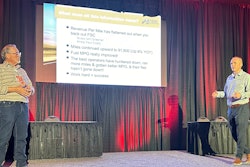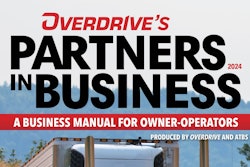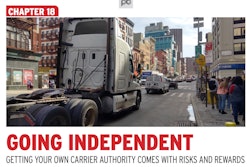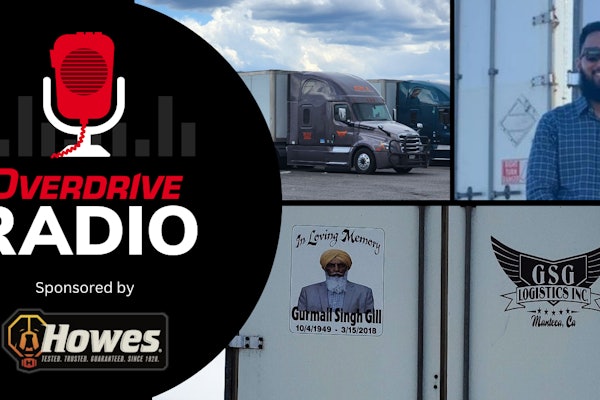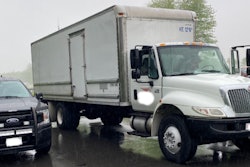In this special-edition Overdrive Radio short, Red Eye Radio host Eric Harley relays an anecdote from a family relation, an owner-operator who lamented the difficulty coping with the hunger-sticken parts of the feast-or-famine business cycles in trucking. That's most certainly where the business has been for at least the last year -- some would say closer to two years at this point -- after post-pandemic highs.
"Dollars and cents matter right now," said ATBS Vice President Mike Hosted, underscoring the point. "Decisions matter."
 This year the Overdrive/ATBS Partners in Business owner-operator business education program is sponsored by Rush Truck Centers, the premier solutions provider to the commercial vehicle industry with 150-plus full-service dealership locations in the United States and Canada. The new PIB book is now available for download.
This year the Overdrive/ATBS Partners in Business owner-operator business education program is sponsored by Rush Truck Centers, the premier solutions provider to the commercial vehicle industry with 150-plus full-service dealership locations in the United States and Canada. The new PIB book is now available for download.
And while a seasoned owner-operator may have a gut feeling about their business performance -- and they may be right 8 to 9 times out of 10 -- prevention practices with finances (not just mechanical prevention) will pay off when the famine is on, noted Gary Buchs, Overdrive contributor and longtime owner-operator business coach.
With a good backstop in a reserve account, or a line of credit opened during one of the feast cycles, you can avoid falling into "panic mode" when cycles turn, Buchs noted -- a recipe for "unwise decisions" you can't take back like one too many unprofitable loads.
"In a time like we're dealing with now, if you run into the necessity of a large repair bill, and if you don't have the cash on hand to pay that, it can be a killer," said Overdrive Editor Todd Dills, rounding out the four-person panel discussion featured here. It's the first in a special midweek series of short excerpts from a talk Overdrive and ATBS had with Harley at the Mid-America Trucking Show in Louisville, Kentucky. The talk was attendant to the March 22 release of the 2024-updated edition of our Partners in Business handbook for owner-operator business, start to finish, with our seminar at the big show.
This short introduces the PIB program and digs further into perspective on building your owner-operator business pantry to insure against those feast-or-famine dynamics and the whims of the business cycles:
The talk aired in full also via Red Eye Radio's Extra Mile podcast at this link.
[Related: How owner-operators still standing weathered the storm against big rates drops]
Todd Dills: Hey everybody, it's Todd Dills here to introduce a special midweek series of short excerpts from a special talk Overdrive and ATBS had with Red Eye Radio's Eric Harley at the Mid-America Trucking Show. The talk was attendant to the release of the 2024 updated edition of our Partners in Business handbook for owner-operator business, start to finish, with our seminar at the big show. This year, sponsored by the Rush Truck Centers nationwide dealer network, the business book is available for download via overdriveonline.com/PIB. Find a direct link to the download page in the show notes wherever you're hearing this number one in the series of shorts. This one introduces the Partners in Business program and digs into perspectives on building your owner-operator business pantry to ensure against the feast or famine dynamics in freight markets, and the whims of business cycles.
Voices other than my own that you'll hear in order of appearance are those of Red Eye Radio host, Eric Harley, ATBS Vice President, Mike Hosted and Overdrive contributor and long-time business coach Gary Buchs. Hopefully it gets you thinking about your own business to set up for success, whatever markets throw at us. Here's Eric Harley starting us up.
Eric Harley: I'm Eric Harley. We're at the Mid-America Trucking Show Day 2, 2024, and joining us right now from Overdrive, we've got the Partners in Business Roundtable, and we lead off by bringing on once again, Todd Dills. Todd, pull up the microphone there and tell us about this initiative, Partners in Business. How far with Overdrive does this go back?
Todd Dills: So Partners in Business started... It's called Partners in Business because it's a partnership between Overdrive and ATBS, the business services firm for owner-operators, and it goes back to, I believe, the year 1999, maybe 2000, and for 20... What is that now, 25 years?
Eric Harley: Wow.
Todd Dills: I didn't take the opportunity to mark a quarter-century milestone, but I guess that's where we are. But 25 years we've been producing the Partners in Business manual. So basically a handbook for owner-operator business, starts with setting things up, motivations, all the legalities of setting a business up, choosing a business structure, all the way through retirement and how to prepare for it, how to save for it, and we update it every year pretty significantly with new material that's been developed throughout the year, and that's no exception this year. The brand-new edition is out at overdriveonline.com/PIB and easy to find and we're here at Mid-America just to talk about that.
But more importantly, Mike Hosted and Gary Buchs, who are with us and are presenting here at Mid-America, and a lot of that presentation draws on real operational data that ATBS puts together, working from averages among its owner-operator clientele, to give folks some benchmarks to see the trends, see what income performance has been like through the tough time here, and offer some strategies to pull your way out of that, to withstand, to maintain profitability through a tough time, and on the other end, hopefully to really make hay when business cycles turn, give you some ideas of when that's going to happen. Mike studies the data pretty closely and has... I know he's got some pretty clear ideas of when that might happen.
Eric Harley: Yeah. Mike Hosted with ATBS, as Todd mentions a partnership that goes back now well over two decades, and we've been talking about, in fact, ATBS on the show for a long, long time. For those who don't know, fills us in what you guys do there at ATBS.
Mike Hosted: Our entire philosophy at ATBS is to help the owner-operator live a richer life, and that means doing everything for them on the back office side. So our goal is to help coach them with their financial statements, do their bookkeeping, do their taxes, but again, most importantly look at their numbers and help them run their truck like a business. And so by doing that, we can help drivers make more money, we can help them get home more and make better decisions on their life and take away their stress.
Eric Harley: Over the years, ATBS has been a strong partner, not just in this initiative, Partners in Business, but that name applies to basically anybody that is doing business with ATBS. How has that changed from where you guys began to where you are now in 2024? I mean, if ever drivers needed, owner-operators needed that business partnership. I mean, I would say it's now more than ever. I mean, would you agree with that statement?
Mike Hosted: I would agree. I think Gary can testament to it as well, but dollars and cents matter right now, decisions matter. Understanding your costs as we've gone through this pandemic, it's just a completely different ballgame where fixed costs are up 8% year over year, variable costs are down 10%, and so when you're choosing a load, you have to understand both your fixed and variable costs to make good decisions, and without those tools, you're kind of running in the dark.
Eric Harley: And Gary, welcome Gary Buchs, who has been part of this initiative as well. Gary, you and I were talking before we went on about some of the practices and also some of the conversations that you'll have with owner-operators as you coach with them, if you talk with them. And part of that as we were talking earlier is breaking that ice saying... If you're looking at a PNL statement saying, all right... You might start that conversation, hey, what's your gut telling you? Which is an important icebreaker in a conversation because sometimes you look at it with the numbers, but a seasoned owner-operator also has a gut feeling saying maybe they know in the back of their mind, okay, this needs to change or that needs to change, or whatever it might be. Tell us about how you work with those owner operators and why that's important to have those conversations with them.
Gary Buchs: Well, thank you Eric, and it's an honor and humbling experience to be here with all of you. The way I work with individuals, everyone is different. Everyone has different needs, and what I've learned, what I call beyond mentoring is... And with what I did and developed and it's evolutionary in the process. So when I talked to an owner, I used to try to have a hard agenda and say, hey, let's look at your P&L. Let's do this. And what I learned was too often they don't have numbers current enough, and then they get embarrassed, they get nervous, and they begin to either make up numbers or make excuses. So I've gone to a format where, hey, let's have a conversation. What's your gut telling you? What's your intuition telling you? Where are you trending? How do you feel mentally? Which direction is that mental energy taking you?
Eric Harley: Right. And you know that's a big thing because look, seasoned owner-operators know... They know their business by now. If they've been out there for any amount of time, they know their business by now, and sometimes there is that red flag and you kind of compartmentalize it or you don't necessarily address it right away. What are some of those key things you think right now that owner operators need to address, need to make sure they're constantly watching and addressing as an owner-operator yourself, what would you be telling them they need to look for?
Gary Buchs: Prevention. Prevention practices, not only mechanically, repairs and so on. Prevention with their finances. When times were good, I really tried to encourage owners that's when you go to the bank, that's when you establish a line of credit while your balance sheet is the best it is, and you develop that history. Just this week, I had a client call, and his truck's been in his shop because someone hit his truck and he had to have it repaired. It wasn't his fault. He had the insurance, it's all being taken care of, but he called his bank because he has a line of credit, and he said, hey, can I defer a month? And they go, you're a month ahead already.
And he goes... They said you had that practice in place where you have always paid a month ahead, so no problem, so don't worry about it. It was a cash flow crunch as much as anything. Owner-operators operate on cash flow so often, so much of their time. So it's a balance between these factors, and so finding that balance and not falling into panic mode where they make unwise decisions.
Eric Harley: My cousin once told me the problem that he had for years was the feast or famine part of trucking as an owner-operator. So he would get into that, and Todd, we've watched it being in the media and covering it for all these years. We watched it with owner-operators where they do get to that cash crunch. But the prevention part of it, as Gary mentions, is key. So if you think in terms of feast or famine, you build out that pantry to make sure that in that famine mode, that pantry is going to be there for you. So you're building that business supply out to make sure that when you run into that lean time, you can walk into that pantry and things are going to be there for you.
Todd Dills: Yeah, I mean, Gary mentioned lines of credit, but definitely spot on there in terms of the timing to do that during the feast part of the equation.
But also just establishing routines that feed exactly what you're talking about and doing it early, setting aside a certain amount of money in a reserve account that you can tap when the unforeseen happens. Because in a time like we're dealing with now, you run into the necessity of a large repair bill like the gentleman Gary was talking about. If you don't have the cash on hand to pay for that, that can be a killer. Then you're stuck with that and you're stuck with all the downtime, all the lost opportunity that you're missing.
Stay tuned for the next installment in the special series, it takes up themes of how to truly be the boss as a business owner. Take control of costs with routine engagement with your numbers among other things. Visit overdriveonline.com/PIB to download the Partners in Business book and learn plenty more from our online series there too about these and other topics. See you next time.

